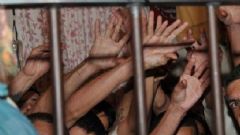Human Rights Voices
While the UN devotes its human rights operations to the demonization of the democratic state of Israel above all others and condemns the United States more often than the vast majority of non-democracies around the world, the voices of real victims around the world must be heard.
Brazil, January 8, 2014
Gory Video Spotlights Chaos at Brazil Prisons
Original source
RIO DE JANEIRO-A gruesome video purporting to show decapitated inmates in a Brazilian prison drew attention to the lawlessness at the nation's correctional facilities.
Local daily Folha de S. Paulo on Tuesday published on its website a video it said was recorded on Dec. 17 by inmates at the Pedrinhas prison complex in the northern Brazilian state of Maranhão.
The newspaper said a union representing employees of the state penitentiary system sent it the video, in which the heads and bodies of three decapitated inmates are displayed in the prison yard. The newspaper provided no motive for the deaths in the video, which was viewed by The Wall Street Journal.
César Bombeiro, the union's vice president, said the video was authentic and was sent to Folha in a bid to draw attention to poor conditions at Maranhão's prisons. He also criticized underinvestment by the state government, noting that the facility at Pedrinhas where the video was shot houses nearly 900 inmates, more than double its capacity.
Maranhão Gov. Roseana Sarney's press office didn't respond to requests for comment on Tuesday. On Monday, addressing an attack against buses in the state capital, she said, "I reaffirm my determination in combating crime and drug trafficking."
Sebastião Uchoa, Maranhão state's justice and penitentiary secretary, didn't answer calls seeking comment.
Brazil's Justice Ministry said this week that Ms. Sarney accepted the federal government's offer to transfer some of the most violent or dangerous prisoners to more secure federal prisons. Brasília late last year sent an emergency team from its National Force for Public Security to help manage security at Pedrinhas.
Prison riots, gang disputes and inmate murders are widespread in Brazil, where the vast majority of correctional facilities are run state governments that often struggle to fund them. But Ignacio Cano, a professor who studies violence at the State University of Rio de Janeiro, said last year's roughly 60 prison deaths in Maranhão, which accounts for little more than 3% of Brazil's 200 million-person population, is outsize.
"São Paulo might have more murders, but it also has a huge inmate population," he said. "For a small state like Maranhão, 60 in just one year is completely unacceptable."
Of those deaths, nine came during a single rebellion in October at the same troubled Pedrinhas prison, according to Brazil's National Justice Council, an agency that oversees the country's justice system.
That incident marked the second time in less than a year that the poor state made international headlines for appalling violence within its borders, after a soccer referee was decapitated after a dispute at an amateur match in June.
A prisoner rebellion at Pedrinhas in 2010 lasted 30 hours and left 18 dead, three of whom were decapitated, according to the National Justice Council. In a report the following year, the justice council concluded that problems such as overcrowding, water shortages, and failure to separate rival gangs sparked the rebellion.
A letter from the council to Brazil's justice minister on Dec. 27 further criticized local authorities. "The state has proved incapable of handling with necessary rigor all the problems with abuse of authority, torture, other kinds of violence and corruption practiced by public agents," wrote Douglas de Melo Martins, a judge on the council, in the letter. The agency didn't comment on Tuesday about the video.
In a statement Monday, the Maranhão government attacked Mr. Martins for spreading "untruths...with the lone objective of further aggravating the situation in the state's prisons."
The gory video raised pressure on Ms. Sarney to address prison conditions after years of scathing reports from Brazil's government. Local press depicted the incident as a black eye for the Sarney family, which-led by federal senator and former Brazilian President José Sarney, Ms. Sarney's father-has dominated Maranhão's politics for half a century.
-Rogerio Jelmayer in São Paulo contributed to this article.

